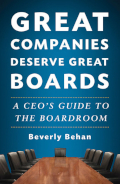|
|
|
|
|
|
|
|
|
Dear reader,
Welcome to the September 2021 edition of The Director’s Dilemma. Each month this newsletter looks at a real-life scenario that happened to a board, perhaps to a board like yours, and considers a range of responses. The scenarios are de-identified to protect the individuals concerned. This month we consider how to recover from a recruitment activity that has gone astray. There will also be some learnings for preventing similar disasters.
Of course, these scenarios are general, written to help you with practical information without the risks that attach to living these situations in real-life. I work with boards and directors as a confidential mentor to help them build great companies and maximise their impact. If you would like personalised service, please call me.
To read this email in a web browser, go to www.mclellan.com.au/newsletter.html and click on 'read the latest issue'. I hope you will enjoy the latest dilemma:
 Karen chairs a government-owned utility board. The CEO recently announced a long-expected decision to retire. Karen chairs a government-owned utility board. The CEO recently announced a long-expected decision to retire.
The board appointed a professional search consultant selected from the government's list of approved service providers. They had a long list of skills and attributes that they wanted in their candidates.
As expected, finding candidates with the skills the board was seeking proved difficult. In addition, all the shortlisted candidates were currently employed and on salaries above pay brackets for this level of appointment within the government sector. None was highly enthusiastic about moving to the public sector at a lower salary.
To help candidates understand the non-monetary benefits of the role, Karen and her board arranged for the three preferred candidates to have coffee with the outgoing CEO and hear firsthand how rewarding the appointment will be.
Unfortunately, the CEO's secretary misunderstood the process and asked the internal HR department to schedule the appointments. Now the three preferred (yet still hesitant) candidates have received a standard email, asking them to come for an interview, rather than a conversation, and asking for CVs, referee details, and other data.
The search consultant is furious, saying that the candidates are now upset because they feel their privacy has been breached when they had not yet said that they were willing to take the position. He has already invoiced 70% of the fee and now claims the process is thwarted.
What can Karen do to help her board recover from this disaster and, hopefully, recruit one of their preferred candidates?
|
|
|
|
Anna's Answer
 This is a very unfortunate course of events which no doubt caused a lot of embarrassment, but it has happened and now needs to be dealt with. As is said, the only way out is through. This is a very unfortunate course of events which no doubt caused a lot of embarrassment, but it has happened and now needs to be dealt with. As is said, the only way out is through.
The first matter to attend to is to contact each candidate as soon as possible to explain to the candidate the original intent behind setting up a meeting with the CEO and to sincerely apologise for the misunderstanding and its consequences. This is something that can be dealt with by the CEO but under the circumstances my suggestion is that it be done by Karen as chair of the board. If a candidate will not accept the apology it will be unfortunate, and it would probably mean that there is no sense in pursuing the recruitment with that candidate.
As far as the search consultant is concerned, it is important to clear the air. The clumsy actions have embarrassed the search consultant and that should be understood and apologised for. Having said that, the search consultant is a service provider and should assist with resolving the issue rather than add fuel to the fire.
The CEO should arrange a meeting with the search consultant to discuss how the situation could potentially be salvaged. As the consultancy is the link between the entity and the candidates it is best to work together on this. With respect to the candidates who accepted the apology, the process could proceed as initially planned but communication regarding this should happen through the search consultant.
The other issue that must be resolved in parallel with the above actions is to determine whether there were any data privacy breaches and if so, how to correct it. If the candidates were not yet willing to take the position, I assume that they would not have shared their CVs, referee details and other data. If they have done so inadvertently, the data must be returned or destroyed depending on what applies together with taking other actions required as per the relevant legislation.
Once the immediate situation has been dealt with and a CEO has been appointed, it will be a good idea for Karen and her board to embark upon CEO succession planning to mitigate the risk of again having to scramble for CEO candidates in future. The plan should approach the matter from various angles, including succession in an emergency, the identification and development of internal candidates, and determining the ways in which potential outside candidates could be found and approached. Succession planning is something that most boards battle with but if Karen and her board get it right it will likely be a big contribution to the future success of the entity.
Anna (Ansie) Ramalho is a professional non-executive director and the chair of the King Committee on Corporate Governance for South Africa. She is currently a non-executive director for KPMG South Africa and South African National Blood Service and Corporate Governance Consultant for International Finance Corporation. She is based in Johannesburg, South Africa.
|
|
|
|
Julie's Answer

This is the sort of disaster that happens when directors don't fully engage with board level recruitment. The board needs to get its act together fast. They can't abdicate to the CEO and search consultant. If the CEO’s retirement decision was expected her board should have been prepared.
First Karen needs to bring together a small group of directors to serve as a nominations committee or task force. They should go through the long list of requirements that the board has compiled and rank these into groups of essential, highly valued, and 'nice to have'. The board need to understand what are the characteristics that the candidate must bring, and what are the skills that the candidate can develop with their support and leadership.
That will help the consultant find candidates who are not unwilling to take on the role.
Then Karen needs to have a frank conversation with the consultant, apologise for making him or her look bad in front of some high-profile candidates, and focus them on creating a list of realistic candidates who are keen to take the role and don't need the outgoing CEO to 'sell' it to them.
A brief conversation with the current CEO to explain the disappointment the board feels at his poor delegation of such an important decision and to request that he, personally, reach out to each of the candidates and apologise for what happened.
The board should prepare for the eventual succession and develop a plan for supporting the eventual new CEO. They should review delegations and create stronger oversight for the early days of the new CEO's tenure. Much of this, but not all, will fall to Karen, as the Chair.
Finally, the board needs to consider its own processes for CEO succession to ensure it is better placed next time. To lose one set of candidates is unfortunate, to lose two would appear to be careless.
Julie Garland McLellan is a non-executive director and board consultant based in Sydney, Australia.
|
|
|
|
Scott's Answer
 If the situation is to be salvaged, Karen must respond quickly. Communication with the Board and CEO as well as with the candidates must take place immediately when it becomes clear that a breach of trust has occurred. If the situation is to be salvaged, Karen must respond quickly. Communication with the Board and CEO as well as with the candidates must take place immediately when it becomes clear that a breach of trust has occurred.
Working with the search consultant, Karen needs to determine what the perceived and/or actual degree to which confidentiality was breeched? Acknowledging candidates' frustrations, they must gain perspective, while representing the client with integrity.
Karen must then engage with each candidate and listen empathetically to their specific concerns. Anticipate some anger. More likely, candidates may see this as proof of a 'typical' government utility mindset, a culture of bureaucratic insensitivity if not arrogance. What will go some way to salvage the situation and establish Karen's integrity with candidates (and by extension that of the board), is for her to 'own' the mistake and not devolve into a blame game. It may help to bring the head of the Nominations Committee or another board member with deep emotional intelligence into the conversation. This signals to candidates the importance attached to the succession process.
If candidates are willing, Karen should continue to facilitate the encounter with the CEO. However, this time, the CEO himself should communicate personally and directly with the candidates (preferably with a call). An authentic apology and taking ownership on behalf of the company for the mistake would be a good start. Then to schedule the 'cup of coffee' chat where he can shift the conversation back to the transcendent purpose of the utility for the community and possibly the nation.
The attributes that will serve Karen best to recover from this incident are speed, integrity, honesty, empathy, and openness, accompanied by a considerable dose of humility. Above all, repositioning with candidates the fact that there is a higher purpose to be pursued in this opportunity.
Scott Eversman is Vice President of the Transatlantic Council of the Boy Scouts of America and Managing Director of Diversified Search. He is based in New York, USA.
|
|
|
|
Julie’s News
August went the same way as July; locked down and restricted. Vaccinations are now becoming the norm. I'm looking forward to September and hoping to get back to my usual workload.
If I can help you or your board, even if only via zoom, please reach out to me for a conversation. You can book a time with this link.
Meet the Governance Greats - I am delighted to be hosting a fireside chat with Mervyn King, Bob Garratt, Bob Tricker and Peter Dey! This is the first ever event with all four of these greatest governance influencers. We will discuss the reasons for their commitment to governance, the sources of their inspiration, and their hopes for the future. You can register at
https://www.goodgovernance.academy/events/good-governance-for-21st-century-organizations
Book Review - Great Companies Deserve Great Boards; a CEO's Guide to the Boardroom by Beverley Behan
 Nobody could disagree with the title of this book. Great Companies Deserve Great Boards. The sad fact is, however, that many companies cannot be great because their boards just don't manage to add that little bit extra that can make all the difference between a reasonable performance, in line with its peers, or an exemplary one, that far outstrips peers. Nobody could disagree with the title of this book. Great Companies Deserve Great Boards. The sad fact is, however, that many companies cannot be great because their boards just don't manage to add that little bit extra that can make all the difference between a reasonable performance, in line with its peers, or an exemplary one, that far outstrips peers.
This book can help your board to make the jump from good to great. It is full of real-life case studies that give positive examples of the actions and activities that will lift the contribution from conformance to performance and into elite board athleticism. The book is full of first hand experiences and the insights from these are easily transferrable across industry sectors and geographic regions. It is like getting ten years' experience in one easy month of part time reading.
The book is well written, succinctly worded and beautifully edited.
Available from Amazon.com.
Inspirational quote for September

Important to focus on opportunities and not just risks.
Do you know where to focus your director and board development? – boards often struggle to get cut through and drive company performance. They work hard, then they work harder, then call in a consultant who recommends some changes, then they work harder still.
If that sounds like your board, don't worry. It is likely that you have simply been focusing on the wrong stuff. I have made a diagnostic tool that might help you to prioritise the actions that will free your board from the drudgery and allow you to maximise your impact. You can take the diagnostic here:
https://directorsdilemma.scoreapp.com
Call me afterwards for help with revitalising your board.
A note on names - A few readers have asked me where I find the names for the protagonists in each case study; I 'borrow' them from people I meet or things that I read. Karen is a Danish diminutive of Katherine, an English name derived from the Greek Aikaterine. The etymology of Aikaterine is contested, but generally considered to have arisen from the Greek root katharos, meaning "pure." Our protagonist will need to demonstrate integrity, if not purity, in extricating her board from this mess.
This newsletter - If you have any ideas for improving the newsletter please let me know. If you are reading a forwarded copy, please visit my website and sign up for your own subscription.
Suggestions for dilemmas - Thank you to all the readers who have suggested dilemmas. They are greatly appreciated. I will answer them all eventually. I could not write this newsletter without your help and without the generous help of all the experts who respond each month to the case studies.
Be a contributor - If you would like to attempt a response to the dilemmas for publication you will be most welcome. Simply reply to this email and let me know.
Let's connect - I use LinkedIn to share information about boards and directorship with my friends and acquaintances. If you use LinkedIn and we are not yet connected I will welcome a connection from you. You can find me at linkedin.com/in/juliegarlandmclellan.
Let me help you - I would be delighted to speak for or train your board, staff, audience and/or group. If I can help, please contact me at julie@mclellan.com.au.
Farewell until the next issue due 1 October 2021. I look forward to greeting you again then. In the interim I hope you will enjoy health, happiness and hard work.
Enjoy governing your companies!
Best regards,
Julie

Main Photo from Shutterstock
Quote Illustration by Julie Garland McLellan
Disclaimer:
The opinions expressed above are general in nature and are designed to help you to develop your judgement as a director. They are not a definitive legal ruling and do not constitute legal advice. Names and some circumstances in the case study have been changed to ensure anonymity. Contributors to this newsletter comment in the context of their own jurisdiction; readers should check their local laws and regulations as they may be very different.
Privacy: I am privileged to have your contact details and keep them as safely as possible. I will alert you if they are ever accessed by any unauthorised person (the technical staff at ayuda help with publishing and issuing the Director's Dilemma and have access so they can send the newsletters to you). I do not sell your details to anyone; they are kept only for the intended purpose - sending you this newsletter and helping to build the judgement of company directors by providing a safe way to consider potential responses to real life events.
|
|
|
|
|
|
|
 Karen chairs a government-owned utility board. The CEO recently announced a long-expected decision to retire.
Karen chairs a government-owned utility board. The CEO recently announced a long-expected decision to retire.
 This is a very unfortunate course of events which no doubt caused a lot of embarrassment, but it has happened and now needs to be dealt with. As is said, the only way out is through.
This is a very unfortunate course of events which no doubt caused a lot of embarrassment, but it has happened and now needs to be dealt with. As is said, the only way out is through.
 If the situation is to be salvaged, Karen must respond quickly. Communication with the Board and CEO as well as with the candidates must take place immediately when it becomes clear that a breach of trust has occurred.
If the situation is to be salvaged, Karen must respond quickly. Communication with the Board and CEO as well as with the candidates must take place immediately when it becomes clear that a breach of trust has occurred.

